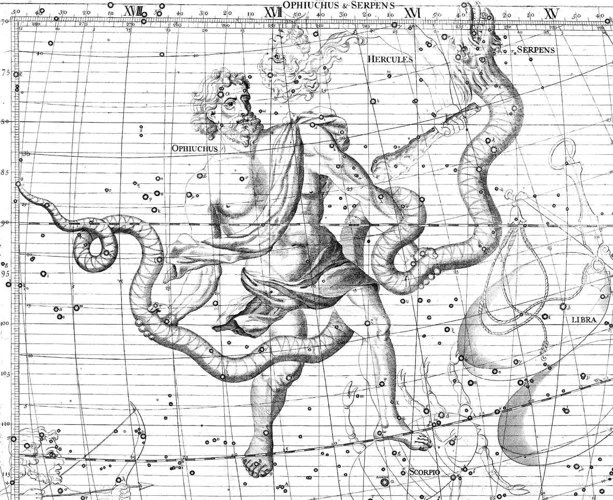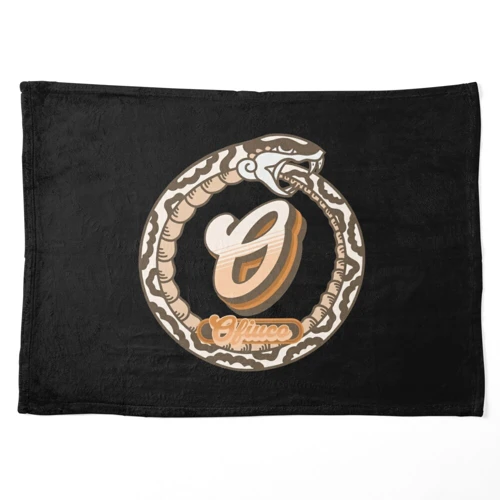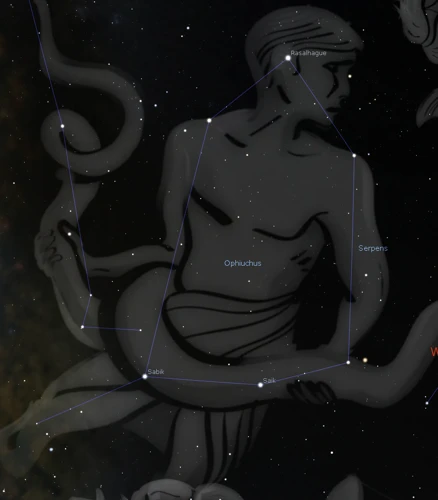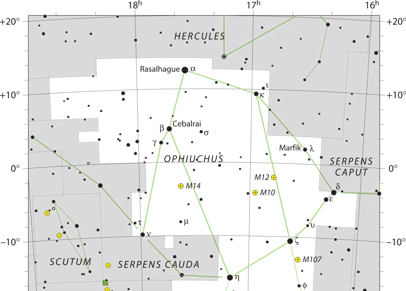Have you ever heard of Ophiuchus? If not, you’re not alone. Ophiuchus is a lesser-known element of both mythology and astrology, often overshadowed by the more familiar signs of the zodiac. However, this enigmatic figure has made its way into literature in various forms throughout history. In this article, we will explore the intriguing references and interpretations of Ophiuchus in literature, shedding light on its mythological origins, its controversial status as a zodiac sign, and its depiction in ancient texts and modern novels. We will also delve into the themes and symbolism associated with Ophiuchus, including healing and rebellion. So, let’s embark on a literary journey to uncover the hidden secrets of Ophiuchus in the world of literature.
Ophiuchus in Mythology

In mythology, Ophiuchus has its roots in ancient Greek mythology, where it is often associated with the god Apollo and the legendary figure of Asclepius, the god of healing. Asclepius was renowned for his ability to cure ailments and even resurrect the dead, which made him a revered and powerful figure in Greek mythology. Ophiuchus is said to represent Asclepius himself or his son, depending on different interpretations. According to mythology, Asclepius was able to learn the art of healing from a serpent. This serpent is often depicted coiled around a rod, which has become the symbol of medicine, known as the Rod of Asclepius. The serpent symbolism in Ophiuchus further reinforces its connection to healing and medicine. It is believed that Ophiuchus was placed in the heavens as recognition of Asclepius’ exceptional healing abilities. This celestial association is intriguing because it suggests that divine healing powers are not confined to the earthly realm but extend to the cosmos as well. Ophiuchus epitomizes the healing and transformative powers that mythology often attributes to divine beings. Its significance in ancient mythology has paved the way for its inclusion in various cultural and astrological contexts. For more information on Ophiuchus’ cultural impact and astrological significance, you can check out the related articles: “Ophiuchus’ Cultural Impact” and “Ophiuchus’ Astrology Personality Traits“.
Ancient Greek Mythology
Ancient Greek mythology holds a rich tapestry of tales that feature Ophiuchus, the serpent-bearer. In Greek mythology, Ophiuchus is closely linked to the god Apollo, the god of medicine, prophetic arts, and healing. According to one myth, the mortal named Asclepius was the son of Apollo and was known for his extraordinary healing abilities. Asclepius’s knowledge of medicine and his prowess in healing attracted attention from both gods and mortals. In fact, Asclepius became so skilled in the art of healing that he could even bring the dead back to life. This incredible power drew the wrath of Hades, the god of the underworld, who feared that Asclepius would disrupt the natural cycle of life and death. Consequently, Zeus, the king of gods, had Asclepius struck down with a lightning bolt to restore the natural order. However, recognizing Asclepius’s extraordinary contributions to humanity, Zeus rewarded him by placing him among the stars as the constellation Ophiuchus. As a celestial figure, Ophiuchus stands as a testament to the ancient Greek belief in the power of healing and the divine connection between the heavens and humanity. To learn more about Ophiuchus’s fascinating role in ancient Greek mythology, you can refer to the article “Ophiuchus in Ancient Mythology“.
Mythical Figures Associated with Ophiuchus
Mythical Figures Associated with Ophiuchus:
1. Asclepius: As mentioned earlier, Asclepius is one of the primary figures associated with Ophiuchus. In Greek mythology, Asclepius was a demigod, the son of Apollo, and the god of healing. He was highly revered for his ability to cure diseases and even bring the dead back to life. Ophiuchus is often seen as representing Asclepius himself or his son.
2. Imhotep: In Egyptian mythology, Imhotep is a legendary figure associated with healing and medicine. He was a polymath, serving as a high priest, architect, and physician during the 27th century BCE. Imhotep was revered as a wise counselor and a skillful healer, often depicted holding a papyrus scroll, symbolizing his knowledge of medicine. Some interpretations link Imhotep to Ophiuchus, highlighting the parallels in their healing abilities.
3. Serpent Figures: Serpents play a significant role in the mythology surrounding Ophiuchus. One of the most famous serpents associated with Ophiuchus is the one that coiled around the Rod of Asclepius in Greek mythology. This serpent is believed to have imparted wisdom and healing knowledge to Asclepius. In other mythologies, such as in Mesopotamian and Mesoamerican cultures, serpents are also linked to healing, wisdom, and transformation, further strengthening the connection to Ophiuchus.
4. Orpheus: Orpheus, a figure from Greek mythology, is sometimes associated with Ophiuchus. Orpheus was a talented musician whose music could charm both humans and animals. His ability to enchant and heal through his melodies aligns with the healing themes attributed to Ophiuchus.
These mythical figures associated with Ophiuchus symbolize the power of healing, wisdom, and transformation. Their stories and attributes have influenced interpretations of Ophiuchus in various cultural contexts, reflecting the enduring fascination with this enigmatic constellation.
Ophiuchus as a Zodiac Sign

Ophiuchus has gained attention and controversy as a potential zodiac sign. Traditionally, the zodiac consists of 12 signs that correspond to specific periods throughout the year. However, Ophiuchus lies along the ecliptic, the path of the Sun, and its constellation overlaps with part of the signs Scorpio and Sagittarius. This has led some to argue that Ophiuchus should be recognized as the thirteenth zodiac sign. Proponents of this idea suggest that individuals born between November 29th and December 17th should be assigned the sign Ophiuchus. Those who align with Ophiuchus as a zodiac sign describe its traits as passionate, mysterious, and inclined towards healing. However, the inclusion of Ophiuchus as a zodiac sign remains controversial within the astrological community. Skeptics argue that the zodiac is a twelve-fold system and that incorporating a thirteenth sign would disrupt its traditional structure. Additionally, the Babylonians, who established the zodiac we know today, did not include Ophiuchus in their system. Despite this controversy, Ophiuchus has generated a significant following, with many people identifying with its characteristics and finding resonance with this supposed ‘hidden sign’ of the zodiac. For more information on Ophiuchus’ astrological significance and personality traits, you can explore the article “Ophiuchus’ Astrology Personality Traits“.
The Controversy Surrounding Ophiuchus
The inclusion of Ophiuchus as a zodiac sign has sparked controversy and debate within the astrological community. Traditionally, the zodiac consisted of 12 signs, each corresponding to a specific time of the year. However, Ophiuchus represents a thirteenth sign, which has challenged the established astrological system. The controversy arises from the fact that incorporating Ophiuchus would require the shifting of dates and altering of the zodiac calendar that has been followed for centuries. Some astrologers argue that the addition of Ophiuchus would disrupt the balance and symbolic significance of the existing signs. There are disagreements about the characteristics and traits associated with Ophiuchus, with differing interpretations and conflicting information. Despite these debates, some astrologers and enthusiasts have embraced the inclusion of Ophiuchus, as they believe it adds depth and nuance to the zodiac system. Whether Ophiuchus is accepted or considered controversial, its presence highlights the ever-evolving nature of astrology and the ongoing discussions within the astrological community.
Ophiuchus in Astrology and Horoscopes
Ophiuchus has become a topic of controversy in the realm of astrology and horoscopes. Traditionally, the zodiac consists of twelve signs, with each sign representing a specific period of the year. However, Ophiuchus falls between Scorpio and Sagittarius and is often referred to as the “13th sign.” This has led to debates about whether Ophiuchus should be included as an official zodiac sign. Proponents argue that Ophiuchus possesses its own distinct characteristics and should be recognized as a separate sign. They associate Ophiuchus with traits such as healing, wisdom, and a strong intuition. Skeptics, on the other hand, believe that the inclusion of Ophiuchus would disrupt the balance and established meanings of the other zodiac signs. They argue that the twelve-sign system has been in place for centuries and should not be altered. Despite the controversy, some astrologers have embraced Ophiuchus and incorporate it into their readings, providing insights based on the position of the celestial bodies during an individual’s birth. The debate surrounding Ophiuchus in astrology and horoscopes highlights the dynamic nature of these systems and the ongoing exploration of celestial influences on human lives.
Depictions of Ophiuchus in Literature

Depictions of Ophiuchus in literature have been prevalent throughout history, spanning various genres and forms of storytelling. Ancient texts such as the Epic of Gilgamesh, the Babylonian creation myth Enuma Elish, and the Indian epic Mahabharata feature references to Ophiuchus as a significant celestial figure. In these texts, Ophiuchus is often associated with healing, astrology, and the pursuit of wisdom. The symbolism of Ophiuchus as a healer and wise figure has transcended time and made its way into modern literature as well. In allegorical representations, Ophiuchus is depicted as a symbol of transformation and redemption. Its serpentine association plays a role here as well, symbolizing the shedding of the old self and embracing spiritual growth. Modern novels further explore Ophiuchus’ mythology and incorporate its themes and symbolism into their narratives. In these novels, Ophiuchus is often portrayed as a mysterious and enigmatic character, embodying the archetype of the outcast or rebel who challenges societal norms. This portrayal reflects the undercurrents of rebellion and non-conformity that have captivated literary works across time. The multifaceted nature of Ophiuchus in literature allows for diverse interpretations and rich storytelling possibilities, making it a compelling and thought-provoking element to explore.
Historical References in Ancient Texts
Historical references to Ophiuchus can be found in various ancient texts, providing us with a glimpse into the significance of this constellation in different civilizations. One notable text that mentions Ophiuchus is the Almagest, written by the renowned Greek astronomer Ptolemy in the 2nd century CE. In the Almagest, Ptolemy classified Ophiuchus as one of the 48 constellations recognized by Greek astronomers during that time. Ophiuchus was depicted as a man holding a serpent, symbolizing the figure of Asclepius. The constellation was situated near the celestial equator, and its discovery and mapping were important for navigation and celestial observation. Another ancient text that references Ophiuchus is the Babylonian MUL.APIN, a collection of astronomical observations and records dating back to the 8th century BCE. In MUL.APIN, Ophiuchus is named “The Serpent Holder” or “The Seizer of the Heel,” representing the god Ningishzida, who was associated with fertility and agriculture. These ancient texts demonstrate the enduring presence of Ophiuchus in human understanding of the cosmos, reflecting its significance in astronomy and mythology of different cultures. Understanding the historical references to Ophiuchus provides valuable insights into its role in ancient societies and their belief systems.
Symbolism and Allegorical Representations
Symbolism and allegorical representations play a significant role in the depiction of Ophiuchus in literature. Ophiuchus is often seen as a symbol of healing, knowledge, and enlightenment. The serpent coiled around the rod, known as the Rod of Asclepius, is a powerful symbol that represents healing and medicine. This symbol is widely recognized in the medical field today. Ophiuchus’ association with healing extends beyond physical ailments. It also symbolizes the healing of the soul and spiritual transformation. The serpent, a creature that sheds its skin and undergoes rebirth, is a metaphor for personal growth and regeneration. Ophiuchus is often portrayed as a figure who challenges traditional norms and acts as a catalyst for change. Its presence in literature serves as a reminder that healing and transformation are often accompanied by rebellion against established systems. Ophiuchus is also associated with the idea of balance and bridging the gap between the physical and spiritual realms. This duality is mirrored in the snake’s ability to both harm and heal. In literature, Ophiuchus’ allegorical representations serve as a reminder of the complex and multifaceted nature of healing and personal growth. Its symbolism invites readers to explore the deeper meaning behind the character and its role in the narrative.
Character Portrayals in Modern Novels
Character portrayals of Ophiuchus in modern novels offer fascinating interpretations of this enigmatic figure. In recent literature, Ophiuchus often appears as a complex and multidimensional character, symbolizing themes of inner strength, hidden potential, and a connection to the supernatural. Authors capitalize on the mystique surrounding Ophiuchus, presenting them as outsiders or outcasts who possess extraordinary abilities or knowledge. These characters are often depicted as healers, wise sages, or individuals with a deep understanding of the human psyche. Their storylines explore the challenges they face in navigating both the earthly and celestial realms. Ophiuchus characters are frequently associated with themes of transformation and redemption, embodying the archetype of a reluctant hero who embarks on an arduous journey of self-discovery. Through their struggles, Ophiuchus characters often learn to embrace their unique qualities and use them for the betterment of themselves and others. These modern portrayals of Ophiuchus in literature serve as a reminder that hidden within every individual lies the potential for greatness and the power to bring about positive change.
Themes and Interpretations

Themes and interpretations associated with Ophiuchus in literature encompass a range of intriguing concepts. One prevalent theme is healing and medical associations. Drawing from its mythological roots, Ophiuchus often symbolizes the power of healing and the pursuit of wellbeing. Characters associated with Ophiuchus in literature are often portrayed as healers, whether through physical medicine or metaphorical healing of emotional wounds. This theme highlights the belief in the transformative nature of healing and the potential for redemption.
Another theme that emerges is rebellion and outcasts. Ophiuchus, being a lesser-known sign of the zodiac, is often seen as an outsider or unconventional figure in literature. Characters associated with Ophiuchus may defy societal norms, challenge authority, or embody a sense of rebellion. They may also be seen as outcasts, individuals who do not fit neatly into established systems or structures. This theme allows for exploration of individuality, the search for personal identity, and the concept of embracing one’s uniqueness.
Transformation and redemption are also prevalent themes in the interpretation of Ophiuchus. Representing the snake coiled around the Rod of Asclepius, Ophiuchus embodies the concept of shedding one’s skin, metamorphosis, and personal growth. Characters associated with Ophiuchus often undergo transformative journeys, overcoming personal trials and achieving redemption or self-acceptance. This theme speaks to the human capacity for change and the potential for personal transformation.
The themes and interpretations surrounding Ophiuchus in literature provide rich material for exploration and creativity. Through the lens of healing, rebellion, and transformation, authors and readers alike can delve into the complexities of human nature and the pursuit of a meaningful existence. Ophiuchus serves as a symbol that reminds us of our own capacity for growth and the unending possibilities that lie within us.
Healing and Medical Associations
Healing and medical associations play a significant role in the interpretation of Ophiuchus in literature. The connection between Ophiuchus and healing stems from its mythological origins, where it represents the god Asclepius, who possessed great healing powers. In literature, Ophiuchus is often depicted as a symbol of healing, with characters associated with this sign embodying the ability to restore health and well-being. These characters are portrayed as healers, doctors, or individuals with extraordinary healing abilities. The presence of Ophiuchus in literature serves as a reminder of the importance of healing and the power of medicine. It emphasizes the human desire for healing and the pursuit of physical and emotional well-being. Ophiuchus also represents the balance between life and death, as healing often involves the restoration of vitality and the prevention of mortality. The association of Ophiuchus with healing and medicine provides a compelling theme in literature, offering a reflection of the human fascination with the preservation and restoration of health.
Rebellion and Outcasts
In literature, the depiction of Ophiuchus often encompasses themes of rebellion and the plight of outcasts. Ophiuchus is frequently portrayed as a figure who challenges the established order, defying societal norms and expectations. This rebellious nature can be seen as a direct reflection of the serpent-slayer archetype that is associated with Ophiuchus in mythology. Just as the serpent in mythology represents chaos and the unknown, Ophiuchus embraces this disruption and deviates from the conventional path. Ophiuchus is frequently depicted as an outsider, someone who is marginalized or ostracized by society due to their unconventional beliefs or actions. This symbolism resonates with readers who have felt like outcasts themselves, finding solace and inspiration in characters who dare to defy the status quo. By embodying the spirit of rebellion, Ophiuchus challenges readers to question societal expectations and norms, encouraging them to embrace their own uniqueness and stand up for their beliefs. Through this portrayal, Ophiuchus becomes a symbol of empowerment for those who find themselves on the fringes of society.
Transformation and Redemption
The theme of transformation and redemption is a prevalent one when it comes to Ophiuchus in literature. Ophiuchus is often portrayed as a figure who undergoes a profound transformation or seeks redemption for past actions. This theme can be seen in various mythological and literary interpretations of Ophiuchus.
In Greek mythology, Ophiuchus is associated with Asclepius, the god of healing. Asclepius was not always a divine figure but was once a mortal who possessed great healing abilities. However, his skills in reviving the dead were seen as a challenge to the natural order of life and death. As punishment, Zeus struck him down with a lightning bolt. However, due to his exceptional abilities, Asclepius was later resurrected and became a god, embodying transformation and redemption.
This theme is also reflected in modern literature. Ophiuchus is often portrayed as a character who has faced adversity, made mistakes, or fallen from grace, seeking redemption for their past actions. The character’s journey towards redemption is often marked by internal struggles, self-discovery, and personal growth. This transformation can be seen as a metaphor for the human capacity for change and the opportunity for redemption, no matter how dire the circumstances.
In some literary works, the symbolism surrounding Ophiuchus’s serpent and the Rod of Asclepius is used to explore themes of healing and redemption. The serpent, often associated with deceit and temptation, becomes a symbol of transformation and the potential for healing. The healing powers attributed to Ophiuchus can be seen as a representation of the ability to heal not only physical wounds but also emotional and spiritual ones.
The theme of transformation and redemption in relation to Ophiuchus highlights the universal human desire for change, growth, and the opportunity to make amends. It showcases the belief in the power of redemption and the potential for individuals to rise above their past mistakes and evolve into something greater. The inclusion of Ophiuchus in literature allows for exploration of these profound themes and offers readers a glimpse into the transformative journey of characters seeking redemption.
Ophiuchus in Poetry
Ophiuchus, with its enigmatic nature and rich symbolism, has also found its way into the realm of poetry. Poets throughout history have been drawn to the intriguing qualities associated with Ophiuchus, and they have utilized its themes and symbolism to express their own artistic visions. In poetry, Ophiuchus is often associated with themes of transformation, redemption, and healing. It serves as a representation of the multifaceted journey of the human spirit and the potential for growth and renewal. Poets use vivid imagery and captivating language to explore the connection between Ophiuchus and these themes. They depict Ophiuchus as a figure who embarks on a transformative journey, casting off the shackles of the past and embracing a new identity. The serpent symbolism associated with Ophiuchus is often employed to highlight the notion of shedding old skins and emerging as a renewed individual. Additionally, Ophiuchus is often portrayed as a compassionate and empathetic healer, offering solace to those in need. Poets use this aspect of Ophiuchus to explore the power of empathy and the potential for healing not only physical ailments but also emotional wounds. The inclusion of Ophiuchus in poetry adds depth and complexity, inviting readers to contemplate the intricate themes and striking symbolism that this celestial figure embodies. Through poetry, Ophiuchus serves as a source of inspiration and contemplation, offering a unique perspective on the human condition and the possibilities for growth and transformation.
Conclusion
In conclusion, Ophiuchus holds a fascinating place in mythology, astrology, and literature. Its origins in ancient Greek mythology associate it with healing and divine powers, captured through the figure of Asclepius. The inclusion of Ophiuchus as a zodiac sign has sparked controversy and debate among astrologers and enthusiasts alike. Its depiction in literature has evolved over time, with historical references in ancient texts, allegorical representations, and character portrayals in modern novels. Themes and interpretations associated with Ophiuchus include healing, rebellion, and transformation, adding depth and complexity to its literary presence. Furthermore, Ophiuchus finds a home in poetry, inspiring poetic expressions that delve into its symbolism and meanings. While Ophiuchus may be less well-known compared to other zodiac signs, its rich mythology and literary representations ensure its enduring relevance. Whether explored through ancient myths, astrology, or the written word, Ophiuchus invites us to contemplate the mysteries of healing, transformation, and the power of the celestial realm.
Frequently Asked Questions
Why is Ophiuchus not widely known in mythology?
Ophiuchus is not as widely known in mythology because it is often overshadowed by the more popular figures and stories of Greek mythology, such as Zeus, Hercules, and Aphrodite.
Is Ophiuchus considered a zodiac sign?
Yes, Ophiuchus is considered to be the 13th sign of the zodiac. However, its inclusion in the zodiac system is a subject of controversy and debate among astrologers.
What are some mythical figures associated with Ophiuchus?
Some mythical figures associated with Ophiuchus include Asclepius, the god of healing in Greek mythology, and Imhotep, the ancient Egyptian deity known for his wisdom and healing abilities.
What does the Rod of Asclepius symbolize?
The Rod of Asclepius, often associated with Ophiuchus, symbolizes medicine and healing. It consists of a serpent coiled around a rod and has become a globally recognized symbol for the medical profession.
Why is Ophiuchus controversial in astrology?
Ophiuchus is controversial in astrology because its inclusion would shift the dates and characteristics of the traditional zodiac signs. Some argue that it disrupts the established astrological system.
Are there any historical references to Ophiuchus in ancient texts?
Yes, there are references to Ophiuchus in ancient texts such as the Astronomica by the Roman writer Marcus Manilius, where it is mentioned alongside the other zodiac signs.
What symbolism and allegorical representations are associated with Ophiuchus?
Ophiuchus is often associated with symbolism related to healing, wisdom, knowledge, and transformation. Its depiction in various artworks and texts showcases these allegorical representations.
Can you find character portrayals of Ophiuchus in modern novels?
Yes, there are modern novels that feature characters associated with Ophiuchus. These portrayals may explore themes of healing, transformation, and rebellion.
How does Ophiuchus relate to healing and medical associations?
Ophiuchus relates to healing and medical associations through its association with Asclepius, the god of healing. The serpent symbolism and the Rod of Asclepius further emphasize these healing and medical connections.
What themes and interpretations are commonly associated with Ophiuchus?
Common themes and interpretations associated with Ophiuchus include healing and medical associations, rebellion and outcasts, as well as transformation and redemption.








